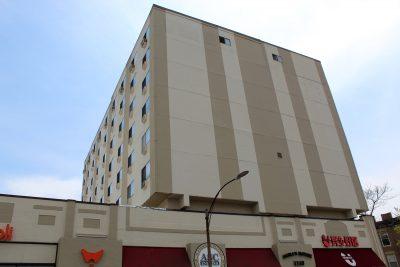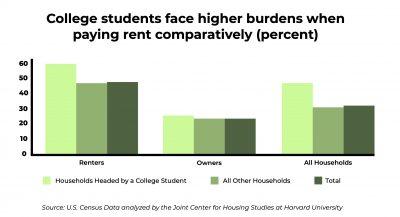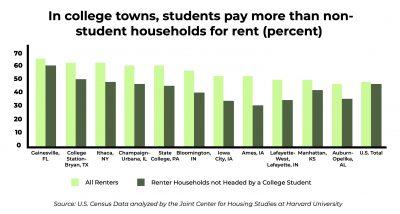
By Daniel Kool and Samuele Petruccelli
Landlords and brokers operating in Allston and Brighton have illegally billed prospective student tenants looking for housing off campus.
Factors including tenant inexperience, predatory behavior and short-term leases associated with student occupancy have contributed to a climate of persistent illegal practices, according to experts in housing law and policy.
“Most landlords and most students are operating in good faith, but you always need to be a skeptical consumer,” Jeff Levine, lecturer of economic development and planning at the Massachusetts Institute of Technology, said.
Levine said students may not be aware of building codes, which mandate safety measures such as smoke detectors and alternative exits.
“It’s challenging because obviously not every student’s a home inspector,” Levine said. “The idea of what meets basic life safety or fire code is just something they’re not familiar with.”

Jessica Adejobi, a freshman in the College of General Studies, said she first started looking for off-campus housing after being unsatisfied with the remaining on-campus options after the first few rounds of rooming selection. She said she was surprised by how quickly the process went.
“The whole process probably took like two weeks max,” she said. “I thought that leasing agents and whatnot would be more hesitant to rent to students.”
Adejobi and her roommates applied for an apartment managed by The Hamilton Company, a Boston-based real estate firm that charged the group a $39 application fee before providing a lease, she said.
Application fees are illegal under Massachusetts General Law, which stipulates that landlords may not charge more than first and last months’ rent, a security deposit and the cost of a new lock and key at or before a tenant signs their lease.
Any lease application fees that landlords and brokers charge prospective tenants are a means of collecting additional revenue without having to provide additional services, Levine said.
“There definitely are landlords who will change an application fee,” Levine said. “They know they’re not going to lease to 95% of them. It’s a way of collecting additional revenue.”
In an interview, Jameson Brown, co-CEO of The Hamilton Company, said he didn’t think the firm charges application fees to prospective tenants. However, a current rental application still lists a $39 fee, according to a prospective tenant’s document.
A representative of The Hamilton Company could not be reached for further comment regarding application fees.
Sargent College of Health and Rehabilitation Sciences freshman Nupur Aroskar, along with her three roommates, was also charged a $40 application fee when she applied for tenancy through Modern Real Estate, a brokerage firm in Allston.

Modern Real Estate declined to comment on their leasing and application process.
James Matthews, clinical fellow at Suffolk University Law School’s Accelerator Practice, who focuses on eviction and tenancy law, said in addition to application fees, landlords may ask for extra charges — such as those to hold an apartment until the lease is signed. None of these additional fees, he said, are legal.
“It’s important for students and all tenants to understand that a landlord can only charge first, last, security and the cost of a new lock and key,” Matthews said. “Landlords shouldn’t be charging application fees or fees to hold the apartment.”
He added that, under state law, landlords cannot charge late fees until rent is at least 30 days late.
While prospective tenants may refuse to pay these illegal fees, landlords could in response refuse to rent to them, according to an advocacy guide to tenants’ rights from the Massachusetts Law Reform Institute. Other potential charges include “pet fees” and “rental fees.”
The short-term nature of most college students’ rentals may create opportunities to exploit them as tenants, Levine said.
“Somebody may complain about something that’s not safe in their building, but then they move out at the end of the semester and the landlord doesn’t have to necessarily feel as pressured to address the concern,” Levine said. “With longer-term tenants, they’re more likely to address those concerns because they’re the same tenants, they’re still there a couple years later.”
George Trammell, a freshman in the College of Arts and Sciences, signed a lease with Boston’s EDGE Realty Advisors in March for a Sept. 1 move-in, said the application process was “pretty painless.” He was not charged an application fee.
Trammell added that he initially felt supported in the touring and application process, but that support began to decline after he and his roommates paid the leasing fees, despite having additional questions for the landlord.
“They were really cordial and on top of everything right up until they got their first paycheck,” Trammell said. “Then we were pretty much in the dark.”
Levine said on-campus housing may be a more reliable option for some students.
“There is an advantage with on-campus housing where you presumably have aligned needs and expectations for safe, affordable housing for students,” Levine said. “Those needs may not always align the same way in the private market.”
Matthews said students should make sure they read and understand their lease before signing it, and noted that Massachusetts Attorney General Maura Healey’s office has been active in issues of tenancy violations.
In a statement, Healey encouraged students with questions to reach out to her office.
“Our state is home to more than half a million students and they have a right to safe and affordable housing,” Healey stated. “We encourage students who are seeking off-campus housing to talk [to] their potential landlord and neighbors about the unit, view the unit, and to carefully read and understand all the terms of their lease before signing it, and importantly, not to agree to anything that is not in the lease.”






















































































































